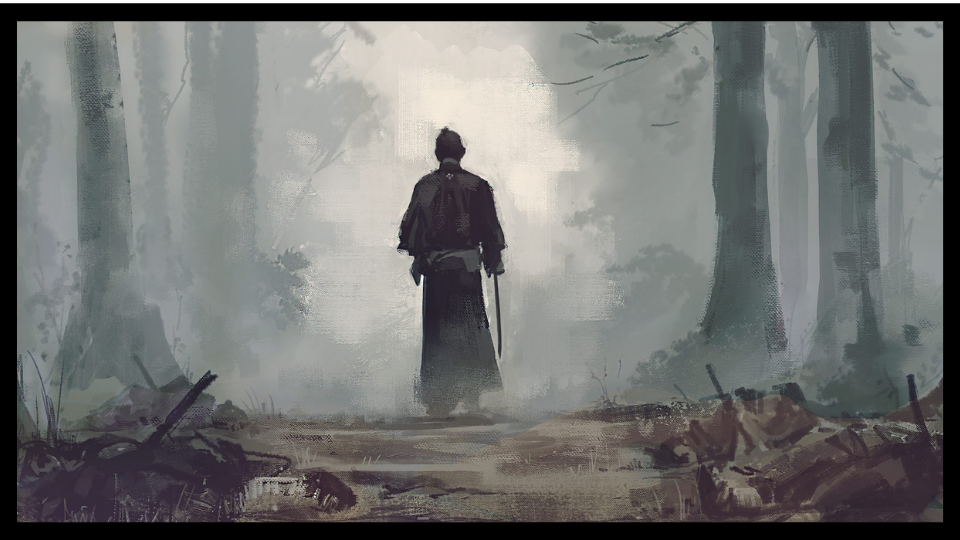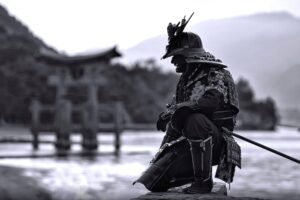An insight into the ascetic mindset of Japan’s legendary undefeated swordsman. In this post we look at his 21 principles and how you can use them to make you sharper in a world designed to dull you.
Table of Contents
Japan's Greatest Swordsman
Miyamoto Musashi (1584–1645) is remembered as Japan’s undefeated sword-saint — a warrior-philosopher forged in the chaos of the Sengoku Jidai and tempered in the disciplined stillness of the early Tokugawa era. He wasn’t simply a duellist; he was a strategist, artist, wanderer, and ascetic who treated life itself as a battlefield for self-mastery.
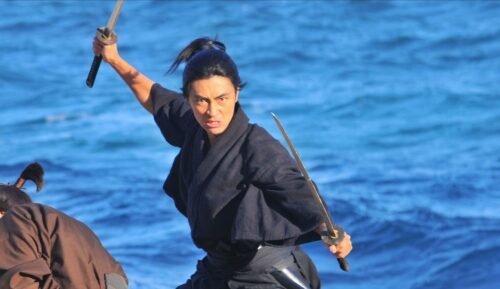
Musashi was famous for fighting with two katana (swords). Most Samurai fought with a single Katana or other weapon.
From Defeat to the Warrior’s Road
Musashi’s first kill came at age 13, and by 1600 he had fought on the losing side at Sekigahara, the battle that secured the Tokugawa shogunate. With his clan defeated and no master to serve, he became a rōnin — a man with no ties, no obligations, and nothing left to lose.
Instead of collapsing, Musashi walked directly into hardship.
He embraced musha shugyō, the “warrior’s pilgrimage”: travelling alone, living rough, and challenging dojos across Japan to refine his skill and spirit. This wandering life shaped him into a fighter who used strategy over brutality, deception over force.

Musashi was on the losing side of the battle of Sekigahara (1600) and was forced to go on the run.
The Duelist Without Fear
Musashi was infamous for using a bokken (wooden sword) in life-or-death duels, humiliating opponents who expected steel. He mastered psychological warfare — arriving late to unsettle rivals, provoking rage to break their focus, and manipulating distance and timing with almost supernatural intuition.
He developed the Nitō Ichi-ryū style of two-sword fencing and reportedly fought over sixty duels, never losing. The details of most are lost, which only added to the legend.

Musashi embarked on a ‘Musha Shugyo’ (warriors pilgrimage). Travelling around Japan and challenging various opponents and schools to duels in order to improve his skills and technique.
Retreat to the Cave
In old age, Musashi withdrew to the Reigandō (“Spirit Rock Cave”), living in silence and contemplation. There he wrote his two great works:
- Go Rin No Sho (The Book of Five Rings): his strategy and combat philosophy.
- Dokkōdō (The Path of Aloneness): his distilled life principles — discipline, detachment, clarity.
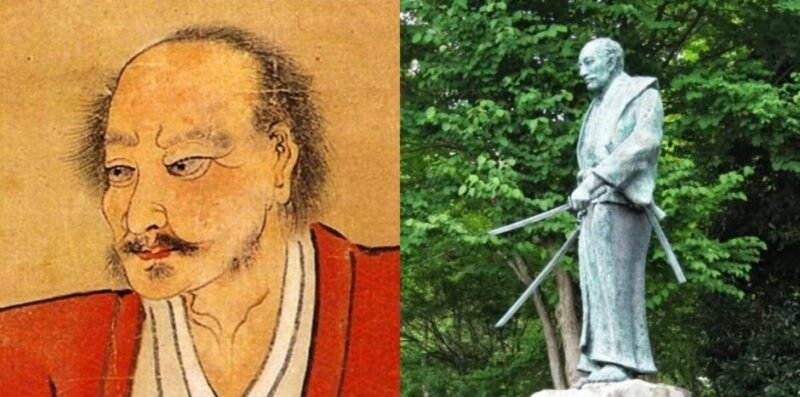
Musashi in later life (self portrait) and Musashi’s grave site in Japan.
A week before his death on 13 June 1645, he gave away his possessions, said farewell to his students, and entrusted these texts to his closest disciple. Today Musashi is revered as a Kensei — a sword-saint — and remains one of Japan’s most enduring cultural icons.

Musashi in popular culture. (left to right) Anime Musashi in ‘Vagabond’. Japanese screen legend Toshiro Mifune as Musashi in ‘Duel at Ichijoji Temple’. Musashi in the hit TV show ‘Westworld’.
The Dokkōdō: Musashi’s Final Lesson
The Dokkōdō — “The Path of Aloneness” — was written by Miyamoto Musashi a week before his death in 1645. It contains 21 principles, each a distilled guideline drawn from a lifetime of combat, Zen practice, discipline, and deliberate solitude. Despite its brevity, it remains one of the most concentrated works of warrior philosophy ever created.
Where The Book of Five Rings teaches strategy, the Dokkōdō reveals Musashi’s inner code: clarity, non-attachment, discipline, humility, and self-mastery. The original manuscript still survives, and its principles remain as sharp now as they were four centuries ago.

Woodblock art depicting Musashi in his duels.
Musashi lived these precepts long before he wrote them. A solitary rōnin, he dedicated himself to swordsmanship, strategy, calligraphy, and contemplation — refining both skill and spirit. For him, these 21 teachings were not suggestions, but the forge through which he shaped himself into Japan’s greatest swordsman.
Over the centuries, the Dokkōdō has been studied by martial artists, business leaders, philosophers, and anyone seeking mastery of the self. A central theme runs through the text: non-attachment — the ability to let go of thoughts, habits, fears, and desires that weaken the mind or distort judgement. Non-attachment is not passivity; it is freedom from the forces that pull us away from our path.
Some Musashi Wisdom
“When you decide to attack, keep calm and dash in quickly, forestalling the enemy…attack with a feeling of constantly crushing the enemy, from first to last.”
“When in a fight to the death, one wants to employ all one’s weapons to the utmost. I must say that to die with one’s sword still sheathed is most regrettable.”
“The path that leads to truth is littered with the bodies of the ignorant.”
“There is nothing outside of yourself that can ever enable you to get better, stronger, richer, quicker, or smarter. Everything is within. Everything exists. Seek nothing outside of yourself.”
A quote for every occasion, be it battle or just everyday life.
The 21 Precepts of Dokkōdō
(Click on the icons for detailed explanation)
1. Accept Everything Just The Way It Is.
Musashi opens with blunt reality: see the world as it is, not as you wish it to be. Some things cannot be changed — your past, other people’s nature, the conditions you were born into. Denial only weakens you. Acceptance strengthens you.
This is not passivity. It’s clarity. When you stop clinging to fantasies of how things should be, you can finally act on what you can control. Energy wasted on the uncontrollable is energy stolen from self-improvement.
Pain, hardship, loss — these are not glitches in the system; they are the system. Musashi lived through war, defeat, exile, and hunger. He could have cursed his fate or wished he’d chosen an easier road under a powerful lord. Instead, he accepted the path in front of him and walked it without complaint.
Acceptance is not surrender.
It’s the starting point of mastery.
2. Do Not Seek Pleasure For Its Own Sake.
Musashi rejected the pursuit of pleasure because it weakens focus. Pleasure is fleeting; mastery is enduring. When you chase comfort, you drift. When you chase purpose, you sharpen.
For Musashi, indulgence was an enemy of progress. He lived like an ascetic because anything that dulled his edge — comfort, distraction, excess — pulled him away from the path. Zen teaches the same principle: pleasure is fine, but attachment to pleasure is poison.
Pleasure becomes a trap when it becomes the goal. The more you feed it, the hungrier it gets. You get the hit, then the emptiness, then the craving for another hit — a self-imposed loop of weakness. The modern world is full of these snares: screens, gambling, cheap highs, empty comforts. They offer satisfaction but steal discipline.
The deepest pleasure isn’t consumption — it’s earned. Athletes, warriors, craftsmen: their fulfilment comes from the grind itself, from the process of becoming better. Pleasure gained through work strengthens the spirit; pleasure taken without effort only numbs it.
Tactical Takeaway: Chase purpose, not comfort. Enjoy pleasure when it comes — but never let it lead.
3. Do Not, Under Any Circumstances, Depend On A Partial Feeling.
Musashi warns against acting from a half-formed thought or emotion. A partial feeling is impulse without clarity — fear, excitement, prejudice, ego, or wishful thinking disguised as intuition. When the mind is fogged, your judgement is compromised.
In Musashi’s world, a single unclear moment could kill him. A reckless strike, a misread movement, or a careless step into an ambush could end everything. He survived because he refused to act on uncertainty. He waited until his awareness was complete, then moved with total commitment.
This precept isn’t anti-intuition.
It’s anti-incomplete intuition.
Real intuition is forged from experience, discipline, and awareness. Partial feelings come from emotion and impulse. Musashi knew the difference, and that distinction kept him alive.
Tactical Takeaway: Don’t act until your mind is clear. When it is — act without hesitation.
4. Think Lightly Of Yourself And Deeply Of The World.
Musashi attacks the root of ego. When you place yourself at the centre of everything, your vision narrows; you see only your wants, your frustrations, your little dramas. The world becomes small because you make it small.
Thinking lightly of yourself is not self-loathing — it is perspective. Your life is a brief spark in a universe that does not care about your pride or your preferences. When you grasp that, the ego loosens its grip.
Thinking deeply of the world means expanding your awareness outward: other people, their roles, their motives, the forces shaping events, the environment, the unseen patterns. A warrior who studies only himself loses. A warrior who studies the world understands how to move through it.
When you stop obsessing over your own importance, you begin to notice everything else — opportunities, dangers, lessons, truths. Humility isn’t morality here; it’s a survival skill.
Tactical Takeaway: Shrink your ego. Expand your awareness. See more than yourself.
5. Be detached from desire your whole life long.
Desire is one of the greatest sources of human weakness. Musashi warns against letting it take the lead — whether it’s desire for approval, wealth, status, victory, comfort, or pleasure. The problem isn’t having desires; it’s being owned by them.
Desire narrows the mind.
It blinds judgement.
It makes you manipulable.
When you want something too much, you stop seeing clearly. You chase illusions, compare yourself to others, and lose the stability needed to walk your path. Zen teaches that attachment creates suffering; Musashi applies this ruthlessly to life and combat.
Detachment doesn’t mean apathy. You can have goals, ambitions, and wants — but you hold them loosely. You don’t allow them to pull you off balance or dictate your identity. Musashi walked his own road because he refused to be seduced by titles, comforts, or the illusion of status. His freedom came from letting desires rise and fall without clinging to them.
Tactical Takeaway: Want things — but don’t need them. Stay centred even when your desires flare.
6. Do not regret what you have done.
Regret changes nothing. The past cannot be edited, negotiated with, or undone. Musashi’s point is simple: regret is wasted energy unless it becomes insight.
Everyone makes mistakes — errors of judgement, missed opportunities, foolish impulses, shameful moments. The only useful response is to examine them with a clear mind, extract the lesson, and move forward. Regret that lingers becomes self-inflicted damage. Regret that is understood becomes experience.
Musashi had lived through war, death, and decisions most people could never carry. He did not dwell on them because he couldn’t afford to. In combat, hesitation born from guilt or self-recrimination is fatal. The warrior learns, adapts, and releases the past so he can stay alive in the present.
This precept is not about ignoring consequences — it’s about not chaining yourself to moments that cannot be changed. Use the past once, as fuel for better action, then let it go.
Tactical Takeaway: Extract the lesson. Burn the regret. Move on.
7. Never be jealous.
Jealousy is a poison that weakens the one who drinks it. Musashi saw envy as a direct threat to clarity: it turns the mind outward, toward comparisons, fantasies, and resentment instead of discipline and action. When you fixate on what someone else has, you abandon your own path.
There will always be people with more talent, more resources, more advantages. This is reality — not an injustice. Jealousy wastes energy that should be spent improving yourself. It clouds judgement, fuels bitterness, and traps you in constant comparison.
The antidote is simple: focus on your own ascent.
If someone is more skilled, study them. If they’re ahead, learn why. If they’ve succeeded, use it as information, not fuel for resentment. Envy narrows your world; discipline expands it.
Jealousy gives you nothing. Action gives you everything.
Tactical Takeaway: Stop watching other people’s progress. Build your own.
8. Never let yourself be saddened by a separation.
Everything in life is temporary — people, places, victories, roles. Musashi understood this more than most. Years of wandering, duelling, and living as a rōnin meant constant partings. He accepted this not out of coldness, but clarity: attachment to what must change only breeds suffering.
Separation is inevitable. Honour what mattered, but do not chain yourself to what is already gone. A warrior must remain present; grief or nostalgia cannot be allowed to cloud judgement.
As part of the warrior class, Musashi lived with death and impermanence as daily realities. Bushidō emphasised the Way of Dying: familiarity with loss, change, and the fragility of life. Musashi refused to let longing or sorrow weaken his resolve. The path demanded forward movement, even when the heart resisted.
Tactical Takeaway: Accept impermanence. Honour what was — but do not cling to it.
9. Resentment and complaint are appropriate neither for oneself or others.
Resentment is wasted force. Complaint is wasted breath. Both pull the mind away from discipline and toward weakness. Musashi saw anger, grudges, and self-pity as obstacles: they cloud awareness, distort judgement, and trap you in stories about how things “should” have been.
The warrior’s path leaves no space for grievance. When you resent others, you lose focus. When you resent yourself, you lose momentum. Musashi’s approach was simple: acknowledge what has happened, release it, and continue moving. Clinging to bitterness — whether directed inward or outward — only ties you to the past.
In Zen, this is the shedding of mental attachments. In Musashi’s life, it was survival. Holding on to resentment dulls the edge of attention, and attention is everything. Energy spent complaining is energy not spent improving.
Let go, not out of kindness, but out of clarity.
Tactical Takeaway: Drop resentment instantly. Redirect every ounce of energy into forward motion.
10. Do not let yourself be guided by the feeling of lust or love.
Lust and love are powerful forces — and anything powerful can pull you off the path. Musashi understood that strong emotions cloud judgement. They make you impulsive, distracted, and vulnerable to manipulation. A warrior cannot allow his direction in life to be dictated by desire or attachment.
This precept isn’t a rejection of relationships; it’s a rejection of dependence. When your identity or stability relies on another person, your centre of gravity shifts outside yourself. You lose clarity. You lose presence. You lose the discipline to follow your own Way.
If you choose to be with someone, it must be without losing yourself. Affection is fine; fixation is fatal. A relationship that supports your purpose strengthens you. A relationship that demands you abandon your purpose weakens you. Musashi’s warning is simple: never hand your focus to emotion.
Desire flares and fades. The path endures.
Tactical Takeaway: Feel deeply if you wish — but be led by purpose, not passion.
11. In all things have no preferences.
Musashi warns that fixed preferences create fragility. When you insist on comforts, routines, or ideal conditions, you become dependent on them. Anything you depend on can be used against you. Anything you cling to can be taken away.
The warrior’s strength comes from adaptability. Musashi trained himself to accept whatever conditions he faced — food, weather, terrain, tools, timing. He refused to be weakened by liking things “just so.” Preference narrows your world; detachment expands it.
To have no preferences is to remain capable anywhere. You move, eat, train, and work with what is available. Nothing needs to be perfect. Nothing needs to be familiar. You are at home in every circumstance because you require nothing specific to function.
Comfort is optional. Adaptability is essential.
Tactical Takeaway: Stop needing things a certain way. Be effective under any conditions.
12. Be indifferent to where you live.
Musashi lived on the road, often with nothing but his swords and the ground beneath him. For him, home was wherever he stopped to rest. Attachment to comfort or luxury weakens the spirit — the more conditions you require to function, the less capable you become when those conditions vanish.
Modern life makes us fragile through abundance. We mistake comfort for necessity. Musashi’s indifference to place made him adaptable anywhere — a stable, a cave, a field, a lord’s household. The Way does not change based on surroundings; discipline must remain constant regardless of setting.
Where you live matters far less than how you live.
Tactical Takeaway: Where you live is irrelevant. How you live is everything.
13. Do not pursue the taste of good food.
Musashi treated food as fuel. Life on the road meant scarcity, simple meals, and long stretches of hunger. Rather than letting appetite dominate him, he trained himself to endure all conditions. To crave rich food is to depend on it — and dependence weakens the will.
Modern abundance has made people fragile. We pursue taste, convenience, and indulgence at the expense of discipline. Musashi’s principle is not anti-enjoyment; it’s anti-attachment. If you need pleasure to function, you’ve already lost.
A warrior eats to sustain the body, not to gratify desire. Strength grows from simplicity.
Tactical Takeaway: Eat to sustain your purpose — not to satisfy cravings.
14. Do not hold on to possessions you no longer need.
Possessions become chains when you cling to them. Musashi travelled with almost nothing because he needed almost nothing. Mobility, clarity, and readiness mattered more than sentiment or comfort. Tools were valued only for their usefulness, and once their purpose ended, he released them without hesitation.
Clutter in your surroundings becomes clutter in your mind. Modern life traps people in accumulation — objects that offer comfort but steal freedom. Keep what serves your purpose. Discard what no longer does. The less you hold, the lighter you move.
Freedom is measured not by what you own, but by what you can walk away from.
Tactical Takeaway: Own little. Need less. Move freely.
15. Do not act following customary beliefs.
Musashi rejected superstition and blind conformity. He sought to see the world as it is, not as tradition or fear insisted it must be. To follow custom without thought is to surrender your judgement — and a warrior’s judgement is his greatest weapon.
This precept demands self-reliance. Do not act simply because others do. Do not borrow beliefs because they are easy, popular, or inherited. Think clearly. Observe reality directly. Let your decisions come from discipline, not from ritual or habit.
Tokitsu records a moment that captures this perfectly. Before a dangerous duel, Musashi passed a Shinto shrine and instinctively reached for the bell to pray for divine protection. He stopped. He realised he was asking the gods only because he feared the coming fight — something he never did in ordinary life. Seeing the inconsistency, he withdrew his hand and walked on. His fate would rest on skill, not superstition.
This is the essence of the precept:
Trust your own clarity. Do not lean on custom, fear, or borrowed belief.
Tactical Takeaway: Act from truth you’ve tested — not traditions you’ve absorbed.
16. Do not collect weapons or practice with weapons beyond what is useful.
Musashi rejected the vanity of accumulating weapons or training in tools he would never use. A warrior’s strength comes from mastery, not variety. He focused his entire life on the sword — the weapon he relied on in real combat — and refused to scatter his attention across ornamental skills or fashionable techniques.
To train in everything is to master nothing. To collect weapons is to burden yourself with objects that add weight but not capability. Musashi valued only what increased effectiveness. Anything else was distraction.
The principle extends beyond blades. Do not cling to gear, tools, or skills that flatter the ego but add no real advantage. Keep what serves your purpose. Discard what doesn’t. Mastery demands focus measured in decades, not hobbies measured in weeks.
Tactical Takeaway: Choose the tools that matter. Train them deeply. Ignore the rest.
17. Do not fear death.
Musashi lived with death in a way almost unimaginable today. Every duel, every ambush attempt, every journey alone across hostile roads placed him one breath away from the end. He fought more than sixty life-or-death duels. He was hunted by rivals and avengers. Mortality was never abstract — it was a constant presence.
A warrior who fears death hesitates. Hesitation is fatal. Musashi’s mastery came from accepting death completely. Once you release the fear of losing life, your actions become sharp, decisive, and undistracted. Presence becomes absolute.
Bushidō emphasises the Way of Dying: to carry death in your mind daily so you may live with urgency, clarity, and honour. Musashi internalised this fully. Death was not something to avoid thinking about — it was the lens that brought life into focus.
To contemplate death is to strip away the trivial. When you remember time is finite, purpose intensifies and excuses dissolve.
Fear death and you shrink.
Accept death and you move freely.
Tactical Takeaway: Keep mortality in view. Let it sharpen you, not paralyse you.
18. Do not seek to possess either goods or fiefs for your old age.
Musashi rejected the mindset of hoarding wealth or preparing for a soft future. To him, clinging to possessions for security breeds fear — fear of loss, fear of change, fear of living fully. A warrior’s security comes from capability, not accumulation.
He travelled light throughout life and gave away his remaining possessions before death. His wealth was mastery, not property. His focus was the Way, not a comfortable retirement.
The message is not to die penniless. It is to avoid building your life around fear of the future. Saving is wise; dependency is weak. Many chase stability so aggressively that they forget to live. Musashi reminds us that everything material is temporary — and none of it follows us beyond the grave.
Invest in skill, character, spirit. These are the only assets that endure.
Tactical Takeaway: Build your strength, not your storage. Security comes from capability, not accumulation.
19. Respect Buddha and the gods without counting on their help.
Musashi honoured the divine, but refused to rely on it. He understood that a warrior who expects intervention — luck, fate, or favour — becomes passive and weak. True strength comes from taking full responsibility for your own actions and outcomes.
The famous moment at the Shinto shrine captures this perfectly: he reached for the bell to pray before a deadly duel, then stopped. It was hypocrisy to ask for help he never sought in ordinary life. If he was to survive, it would be through discipline, skill, and clarity — not divine rescue.
Respect the gods. Respect the spiritual order of the world. But do not expect them to fight your battles. The highest form of devotion is effort: training, preparation, resilience, and absolute ownership of your path. Prayer may focus the mind, but it does not replace action.
Tactical Takeaway: Honour the divine — rely on yourself. The gods do not swing the sword for you.
20. You may abandon your own body but you must preserve your honour.
For Musashi, the body was temporary, but honour was the enduring core of a person’s spirit. A warrior could face death without hesitation, but to act shamefully — through cowardice, betrayal, or corruption — was a deeper kind of destruction. Physical death ends the body; dishonour erodes the self.
In the world of the samurai, honour was not abstract. It governed conduct in battle, in duty, and in daily life. A warrior would rather face death than violate the principles that defined him. Musashi, though a rōnin, was raised in this culture of severe integrity: your name, your reputation, and your inner code were worth more than survival.
The modern lesson is clear: never trade your principles for convenience, approval, or material gain. When you act against your own values, you fracture yourself from within. Keeping your honour means maintaining alignment between belief and action, no matter the cost.
Honour is the sharpness of the spirit.
Let nothing dull it.
Tactical Takeaway: Protect your integrity more fiercely than your comfort or safety. The body can fall; the inner blade must not.
21. Never stray from the way.
For Musashi, the Way was everything — the path of mastery, discipline, and inner alignment. He refused wealth, comfort, and status because they pulled a warrior away from purpose. By staying committed to the Way, he sharpened his life into a single, unbroken line: the pursuit of absolute skill and clarity.
To remain on the Way is to resist distraction, vanity, and drift. It means holding to your principles when convenience tempts you away, and returning to your path whenever you feel yourself slipping. Musashi never allowed reputation, opportunity, or ease to dilute his practice. His life was a testament to unwavering direction.
The final precept unites all the others: discipline, detachment, presence, acceptance, and integrity. Mastery is not a moment but a lifelong alignment. When you follow the Way without deviation, your actions, spirit, and purpose converge.
Do not wander.
Do not drift.
Stay the course.
Tactical Takeaway: Choose your path with clarity — and walk it without compromise.
Final Thoughts
Miyamoto Musashi lived in an age of steel and death, yet his teachings cut more cleanly through the confusion of the modern world than ever before. We live in a time defined by noise, distraction, comfort, and endless shallow appetites. Musashi faced swords; we face a slow erosion of purpose. The threat is different — the stakes are the same.
The Dokkōdō endures because it demands what few people in any era are willing to give: discipline, detachment, clarity, and a life lived on purpose. It strips away every illusion civilisation tries to sell you — status, comfort, accumulation, validation — and leaves only the path, the work, and the person walking it.
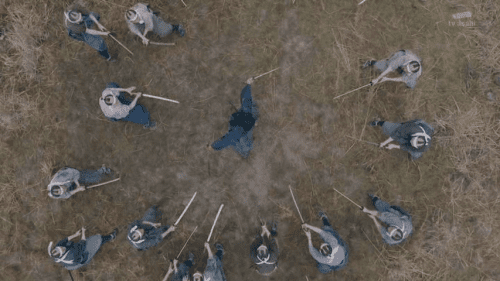
Always outnumbered, never bettered.
Musashi is relevant today not because we wield blades, but because we’re surrounded by temptations that dull the spirit. His 21 precepts offer a counter-culture in the purest sense: a way to stay sharp in a world that encourages softness, a way to remain focused when everything pulls us apart, a way to stay aligned with who we choose to be.
The world changes.
The Way does not.
And for the individual willing to walk it, Musashi still stands at the end of the road — undefeated.
If you are interested in reading Miyamoto Musashi’s guide to strategy the Book of the Five Rings click on the link below for a free PDF version.
If you have enjoyed our post please share or feel free to comment below 
Related Posts
Our Other Posts

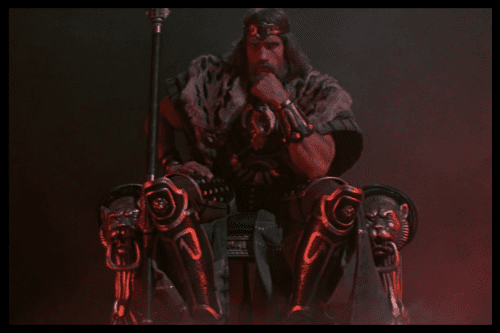
Conan the Barbarian Workout
Welcome to our Conan the Barbarian workouts. Strongman circuits to test strength, stamina and willpower.





